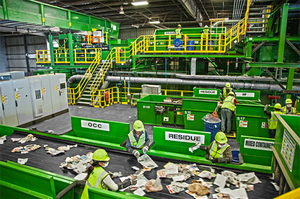January 1, 1994
Ann Kulik
Though emulated in Europe and eyed from abroad, Germany's recycling system is under fire at home. In 1991, the country began recycling packaging used to transport goods; in 1993, the system was expanded to include all secondary and primary packaging materials.
A key component in the system is active involvement of German citizens, who place source-separated consumer packaging marked with the Green Dot symbol in yellow sacks and bins for collection and recycling. By last fall, most local and regional governments had signed contracts with the Duales System Deutschland (DSD), a private company whose services parallel those of the municipal waste collection and disposal system.
Confronted with the possibility of having to retrieve packaging left in retail shops by consumers, industry finally responded to the waste problem. Manufacturers are now encouraged to shift to easily recyclable materials, for example by reducing the amount of PVC-based plastics. Germany's Minister for the Environment, Klaus Topfer, stated in an interview with Der Spiegel magazine that, "no packaging has remained unchanged."
Researchers are striving to pare down packaging wherever possible. For instance, a major washing detergent manufacturer has cut its package weight by 15 percent per kilogram of detergent and the steel can industry has nearly halved the material needed for cans. Reusable packaging that is being promoted includes refillable containers for milk, fabric softeners and motor oil. Innovative packaging ideas have been developed, such as chocolate boxes made of degradable starch and sugar and yogurt cups consisting of an impermeable, edible waffle. Transport packaging that can be reused up to 30 times shows promise as a means to combat paperboard waste.
Pressure is escalating to meet the new quotas to be implemented in July 1995. In order to reduce landfill quantities by about 8 million tons a year, collection rates must increase to 80 percent for each packaging material; also, 80 percent of all paper, paperboard, plastic and composite packaging collected and 90 percent of all glass, steel and aluminum containers collected will have to be sorted to a quality suitable for recycling.
But the quantities of waste to be recycled in an affluent consumer society of 80 million people are staggering. According to Der Spiegel, 4 billion steel beverage cans and close to 15 million metric tons of paper are discarded annually. Used glass is recovered at a rate of 3 million metric tons a year, but only two-thirds of that is recyclable.
And plastics are creating a crisis. Tonnages recovered in 1993 are estimated at four times the anticipated amount. The 1995 quota would require recycling 700,000 metric tons a year, according to MullMagazin. Plastics found in German household waste consist predominantly of polyethylene and polypropylene, followed by polystyrene, polyvinyl chloride and other resins (see chart).
Critics contend that Green Dot recycling leads to an environmental dead-end, either by delaying disposal to the point where "downcycling" reaches its limit or by transferring the disposal burden to other places through exportation. They find Germany's goal of a circulatory economy, where materials return through the loop repeatedly, to be nothing more than fiction. Many arguments against reliance on maximum recycling resemble those cited in the U.S., such as the degradation of material quality as quotas are raised and the comparatively low-quality, low-demand or high-priced products often generated by recycling.
Critics also point to problems specific to Germany's situation:
* Underestimated costs, requiring recent hikes in Green Dot licensing fees of up to one-third to keep the DSD afloat;
* Misinterpretation of the Green Dot as an eco-label;
* Failure of some producers to pay their licensing fees;
* The chemical industry's default on its recycling obligation;
* Potential fire hazard at sites where surplus recovered plastics are stored; and
* Scandals involving the discovery of Green Dot plastics in landfills as far away as Asia, plus alleged bribery by a Bulgarian recycling firm lacking adequate technology and capacity to process the quantities delivered.
In July 1993, a new company, DEKUR Plastic Recycling, was founded to take responsibility for plastics storage and recycling. It is funded through licensing fees.
Meanwhile, an environmental counter-reformation is underway. What Topfer calls a "waste system unique in all the world," political opponents see as bound to change with "Super Election Year 1994."
You May Also Like


